Hiring the right social media professional is harder than ever. With the rising influence of digital platforms, it's crucial to ask the right questions to identify the best talent for your team.
This blog post offers a comprehensive list of interview questions tailored to various levels of social media roles, from junior coordinators to senior strategists. You will find specific questions related to content strategies, performance metrics, and situational scenarios relevant to social media specialists.
By utilizing these questions, you can streamline your interview process and make more informed hiring decisions. For a more thorough assessment, consider pairing these questions with an SEO assessment test before interviewing candidates.
Table of contents
8 general Social Media interview questions and answers to assess applicants
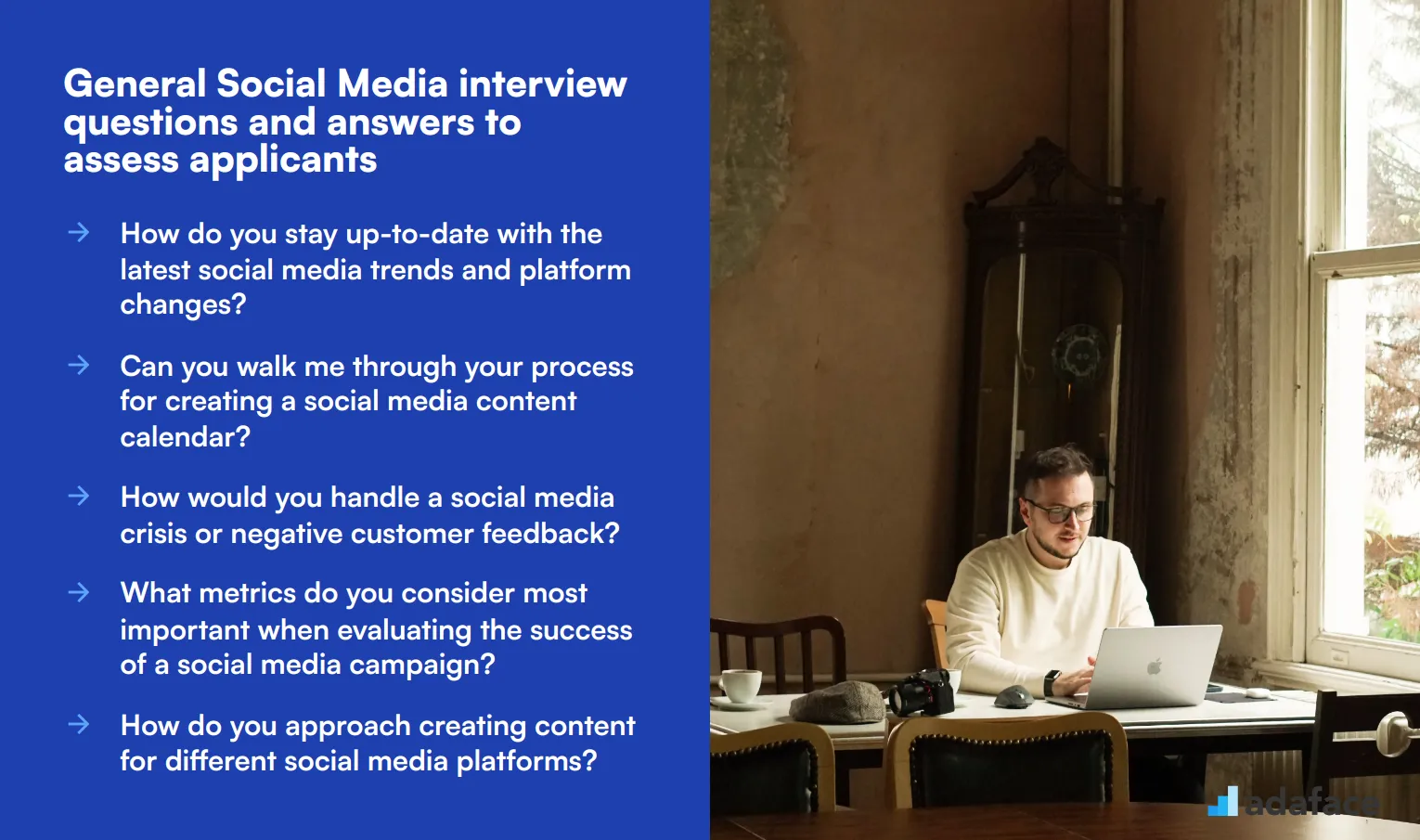
Ready to dive into the world of social media savvy? These eight general interview questions will help you assess candidates' understanding of social media strategies and trends. Use them to gauge applicants' knowledge, creativity, and problem-solving skills in the ever-evolving digital landscape.
1. How do you stay up-to-date with the latest social media trends and platform changes?
A strong candidate should demonstrate a proactive approach to staying informed about the rapidly changing social media landscape. They might mention:
- Following industry thought leaders and influencers on social platforms
- Subscribing to relevant newsletters and blogs
- Participating in webinars and online courses
- Attending industry conferences and networking events
- Regularly experimenting with new features and tools on various platforms
Look for candidates who show genuine enthusiasm for learning and can provide specific examples of how they've applied new knowledge to their work. This indicates a digital marketer who can adapt quickly to platform changes and leverage emerging trends effectively.
2. Can you walk me through your process for creating a social media content calendar?
An effective response should outline a structured approach to content planning. Key steps might include:
- Analyzing audience demographics and preferences
- Identifying key business objectives and KPIs
- Brainstorming content themes and topics
- Researching relevant hashtags and trends
- Planning content types (e.g., text, images, videos) for each platform
- Scheduling posts at optimal times for engagement
- Incorporating space for real-time and reactive content
Pay attention to candidates who emphasize the importance of balancing planned content with flexibility for timely, reactive posts. A strong answer will also mention tools they use for organization and collaboration, showing their practical experience in managing content calendars.
3. How would you handle a social media crisis or negative customer feedback?
A well-prepared candidate should outline a clear crisis management strategy:
- Monitor mentions and respond quickly
- Assess the situation and its potential impact
- Craft a sincere, empathetic response
- Take the conversation offline when appropriate
- Keep internal stakeholders informed
- Follow up and ensure resolution
- Analyze the incident and update protocols if necessary
Look for candidates who emphasize the importance of maintaining a calm, professional tone and being transparent in their communications. They should also mention the value of having a crisis management plan in place before issues arise, demonstrating their proactive approach to social media coordination.
4. What metrics do you consider most important when evaluating the success of a social media campaign?
A comprehensive answer should include both vanity metrics and more meaningful engagement and conversion metrics:
- Reach and impressions
- Engagement rate (likes, comments, shares)
- Click-through rate (CTR)
- Conversion rate
- Cost per click (CPC) or cost per acquisition (CPA)
- Audience growth rate
- Share of voice
- Sentiment analysis
Pay attention to candidates who emphasize the importance of aligning metrics with specific campaign goals. They should be able to explain how different metrics can provide insights into various aspects of campaign performance, from brand awareness to lead generation and customer loyalty.
5. How do you approach creating content for different social media platforms?
A strong answer should demonstrate an understanding of each platform's unique characteristics and audience expectations. Candidates might mention:
- Adapting content format and tone to suit each platform (e.g., professional for LinkedIn, casual for TikTok)
- Optimizing content for platform-specific features (e.g., hashtags on Instagram, threads on Twitter)
- Considering optimal post lengths and image/video dimensions for each platform
- Tailoring messaging to align with platform-specific user intent (e.g., entertainment on YouTube, networking on LinkedIn)
- Leveraging platform-specific tools and features (e.g., Instagram Stories, Twitter Polls)
Look for candidates who emphasize the importance of maintaining a consistent brand voice across platforms while adapting to each platform's strengths. They should also mention the value of analyzing platform-specific analytics to refine their approach over time.
6. How would you increase engagement and grow our social media following organically?
A comprehensive strategy for organic growth might include:
- Consistently posting high-quality, relevant content
- Engaging with followers through comments and direct messages
- Using relevant hashtags and participating in trending conversations
- Collaborating with influencers or complementary brands
- Running contests or user-generated content campaigns
- Optimizing posting times based on audience activity
- Cross-promoting social accounts on other platforms and owned media
- Leveraging employee advocacy programs
Evaluate candidates based on their ability to provide a multi-faceted approach that goes beyond simply posting content. Look for those who emphasize the importance of building genuine connections with the audience and creating shareable, valuable content that naturally encourages followers to spread the word.
7. Can you describe a social media campaign you're particularly proud of and why it was successful?
This question allows candidates to showcase their practical experience and strategic thinking. A strong answer should include:
- A clear description of the campaign objectives
- The target audience and platforms used
- The creative concept and execution
- Specific tactics employed
- Measurable results and key takeaways
Pay attention to how candidates analyze the campaign's success. Look for those who can articulate not just what they did, but why it worked, demonstrating their ability to derive insights from their experiences. This question also offers an opportunity to assess their storytelling skills, which are crucial for effective content creation.
8. How do you balance creativity with brand guidelines and messaging in your social media content?
An effective answer should demonstrate the candidate's ability to innovate within established parameters:
- Thoroughly understanding the brand voice, values, and visual identity
- Using brand guidelines as a foundation for creative ideation
- Finding unique angles or interpretations of brand messages
- Adapting brand elements to fit different social media contexts
- Regularly reviewing content ideas with the marketing team or brand managers
- Proposing updates to brand guidelines when necessary to keep up with social media trends
Look for candidates who can articulate the importance of consistency in building brand recognition while also showing flexibility in adapting to the dynamic nature of social media. A strong candidate will emphasize the balance between adhering to guidelines and pushing creative boundaries to keep content fresh and engaging.
20 Social Media interview questions to ask junior coordinators
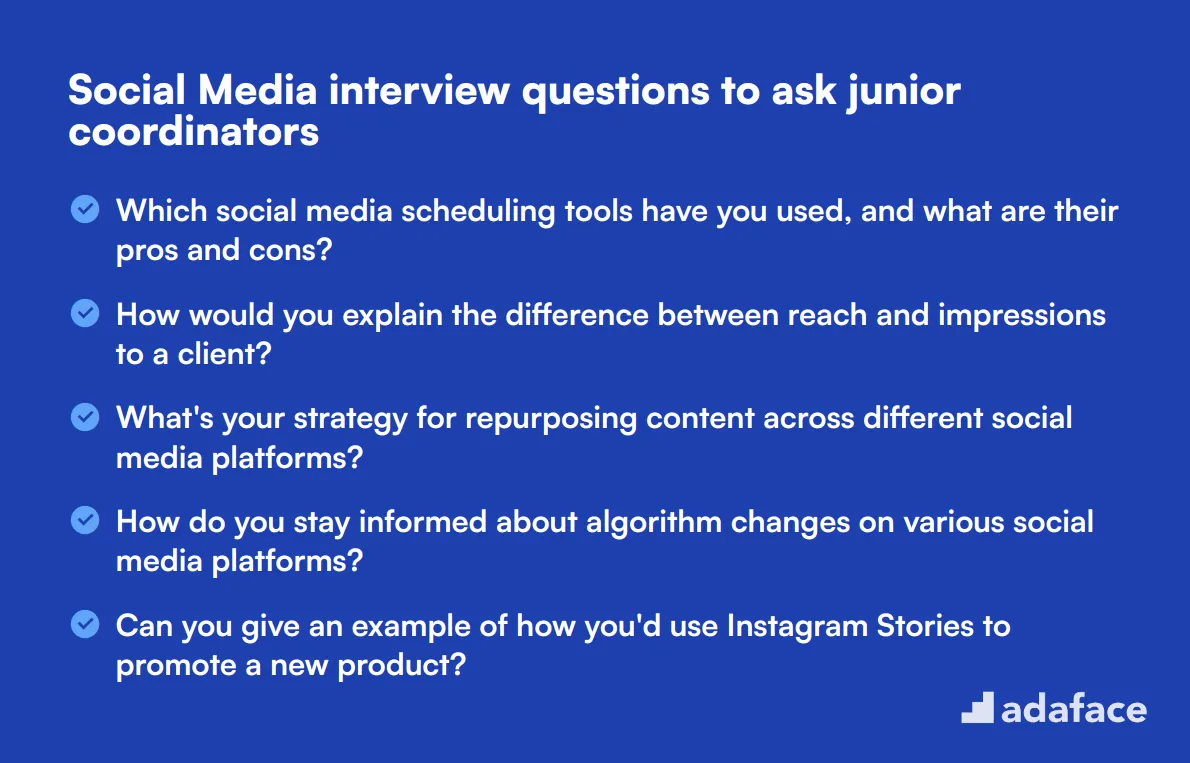
When interviewing junior social media coordinators, it's crucial to assess their basic skills and understanding of social media platforms. Use these 20 questions to gauge candidates' knowledge, creativity, and problem-solving abilities in real-world social media scenarios.
- Which social media scheduling tools have you used, and what are their pros and cons?
- How would you explain the difference between reach and impressions to a client?
- What's your strategy for repurposing content across different social media platforms?
- How do you stay informed about algorithm changes on various social media platforms?
- Can you give an example of how you'd use Instagram Stories to promote a new product?
- What's your approach to hashtag research and usage?
- How would you handle a situation where you accidentally posted incorrect information?
- What's your process for conducting a social media audit?
- How do you determine the best times to post on different social media platforms?
- Can you explain the concept of social listening and how you'd implement it?
- What strategies would you use to increase video views on our YouTube channel?
- How would you approach creating a TikTok challenge for our brand?
- What tools do you use for creating visually appealing social media graphics?
- How do you measure the ROI of a social media influencer campaign?
- What's your strategy for encouraging user-generated content?
- How would you use social media to support customer service efforts?
- Can you explain the difference between organic and paid social media strategies?
- What's your approach to writing compelling social media ad copy?
- How would you use LinkedIn to build our brand's professional network?
- What steps would you take to improve our social media presence on a limited budget?
10 intermediate Social Media interview questions and answers to ask mid-tier managers
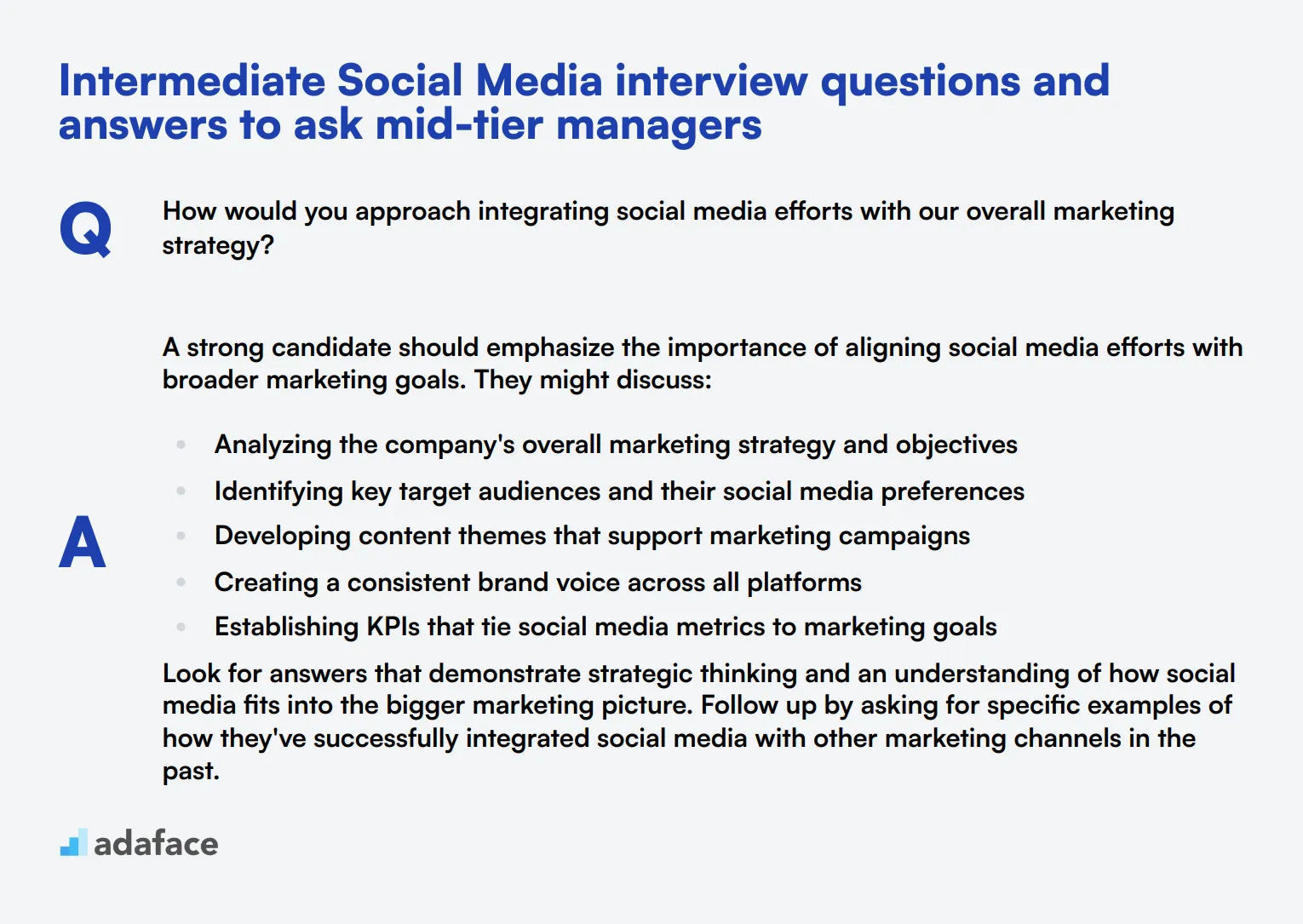
Ready to level up your social media hiring game? These intermediate questions are perfect for assessing mid-tier managers who should have a solid grasp of social media strategies. Use them to dig deeper into candidates' experience and problem-solving skills, and get ready for some insightful responses!
1. How would you approach integrating social media efforts with our overall marketing strategy?
A strong candidate should emphasize the importance of aligning social media efforts with broader marketing goals. They might discuss:
- Analyzing the company's overall marketing strategy and objectives
- Identifying key target audiences and their social media preferences
- Developing content themes that support marketing campaigns
- Creating a consistent brand voice across all platforms
- Establishing KPIs that tie social media metrics to marketing goals
Look for answers that demonstrate strategic thinking and an understanding of how social media fits into the bigger marketing picture. Follow up by asking for specific examples of how they've successfully integrated social media with other marketing channels in the past.
2. Can you describe your experience with social media advertising? How do you approach creating and optimizing ad campaigns?
An experienced candidate should be able to discuss:
- Familiarity with ad platforms on major social networks (Facebook Ads, Twitter Ads, LinkedIn Ads, etc.)
- Understanding of targeting options and audience segmentation
- Experience with A/B testing ad creative and copy
- Knowledge of bidding strategies and budget optimization
- Use of retargeting and custom audiences
Pay attention to candidates who emphasize data-driven decision making and continuous optimization. Ask for specific examples of successful campaigns they've run and the results they achieved.
3. How do you approach building and maintaining relationships with influencers?
A skilled social media manager should outline a systematic approach to influencer marketing:
- Identifying relevant influencers in the industry
- Vetting influencers for authenticity and engagement rates
- Developing personalized outreach strategies
- Creating mutually beneficial partnerships
- Tracking and measuring influencer campaign performance
Look for candidates who understand the nuances of influencer relationships and can discuss both the benefits and potential pitfalls. Ask about their experience handling influencer collaborations and any challenges they've faced.
4. How would you go about creating a social media style guide for our brand?
A comprehensive answer should include the following steps:
- Analyzing the brand's existing voice, tone, and visual identity
- Defining guidelines for language use, including tone and vocabulary
- Establishing rules for visual elements (logos, colors, fonts, image styles)
- Creating templates for different types of posts
- Providing examples of do's and don'ts
- Outlining processes for content approval and quality control
Ideal candidates will emphasize the importance of consistency across all platforms while allowing for platform-specific adaptations. They should also mention the need for regular updates to the style guide as the brand evolves.
5. What's your approach to managing a social media crisis?
A strong candidate should outline a clear crisis management plan:
- Monitoring: Implementing tools to catch potential issues early
- Assessment: Quickly evaluating the severity and potential impact of the situation
- Response team: Assembling key stakeholders to address the crisis
- Communication: Crafting a timely, transparent, and appropriate response
- Action: Implementing necessary changes or solutions
- Follow-up: Monitoring the situation and providing updates as needed
- Analysis: Conducting a post-crisis review to prevent future incidents
Look for candidates who emphasize the importance of preparation, quick response times, and maintaining brand integrity throughout the crisis. Ask for specific examples of crises they've managed and the outcomes.
6. How do you stay informed about emerging social media platforms and decide whether to adopt them for our brand?
A savvy social media manager should discuss:
- Regularly following industry news and trend reports
- Participating in social media marketing communities and forums
- Attending conferences and webinars
- Experimenting with new platforms personally
- Analyzing the platform's user demographics and potential fit with the brand's target audience
- Evaluating the platform's features and potential for achieving marketing objectives
- Considering resource requirements for managing an additional platform
Look for candidates who balance curiosity about new trends with a strategic approach to platform adoption. Ask them to provide an example of a time they successfully introduced a new platform to a brand's social media strategy.
7. How would you approach creating a social media content strategy for a new product launch?
An effective answer should include the following steps:
- Research: Understanding the product, target audience, and competitive landscape
- Goal setting: Defining clear objectives for the launch campaign
- Platform selection: Choosing the most appropriate channels for the target audience
- Content planning: Developing a content calendar with pre-launch, launch, and post-launch phases
- Engagement strategies: Planning interactive elements like contests or Q&A sessions
- Influencer collaboration: Identifying and partnering with relevant influencers
- Paid promotion: Allocating budget for sponsored content and ads
- Measurement: Setting up tracking for key performance indicators
Look for candidates who emphasize the importance of an integrated approach, connecting social media efforts with other marketing channels. Ask about specific product launches they've worked on and the results they achieved.
8. How do you approach social media competitive analysis, and how often do you conduct it?
A thorough answer should cover:
- Identifying key competitors in the industry
- Analyzing competitors' social media presence across platforms
- Examining content strategy, posting frequency, and engagement rates
- Evaluating audience growth and interaction patterns
- Identifying gaps and opportunities in the competitive landscape
- Using social listening tools to track brand mentions and sentiment
- Conducting regular (e.g., monthly or quarterly) in-depth analyses
- Providing actionable insights based on the analysis
Look for candidates who understand the importance of ongoing competitive analysis and can explain how they use these insights to inform strategy. Ask for examples of how their competitive analysis has led to successful strategy adjustments.
9. How do you measure and report on the ROI of our social media efforts?
A strong candidate should discuss:
- Aligning social media KPIs with overall business objectives
- Tracking metrics such as engagement rates, reach, conversions, and lead generation
- Using UTM parameters to track traffic and conversions from social media
- Implementing social media listening tools to measure brand sentiment and share of voice
- Calculating the cost per lead or acquisition from social media campaigns
- Analyzing the impact of social media on customer lifetime value
- Creating regular reports that translate social media metrics into business impact
Look for candidates who can bridge the gap between social media metrics and business outcomes. Ask them to provide an example of how they've demonstrated ROI to stakeholders in the past.
10. How would you approach training and managing a team of social media coordinators?
An experienced manager should outline a comprehensive approach:
- Skill assessment: Evaluating each team member's strengths and areas for improvement
- Training program: Developing a structured onboarding and ongoing training plan
- Clear roles and responsibilities: Assigning specific tasks and platforms to team members
- Goal setting: Establishing individual and team KPIs
- Regular check-ins: Conducting one-on-one meetings and team huddles
- Feedback and recognition: Providing constructive feedback and acknowledging good work
- Fostering creativity: Encouraging idea sharing and brainstorming sessions
- Performance reviews: Conducting regular evaluations and setting development plans
Look for candidates who emphasize both skill development and team building. Ask about their management style and how they handle challenges within a team.
15 advanced Social Media interview questions to ask senior strategists
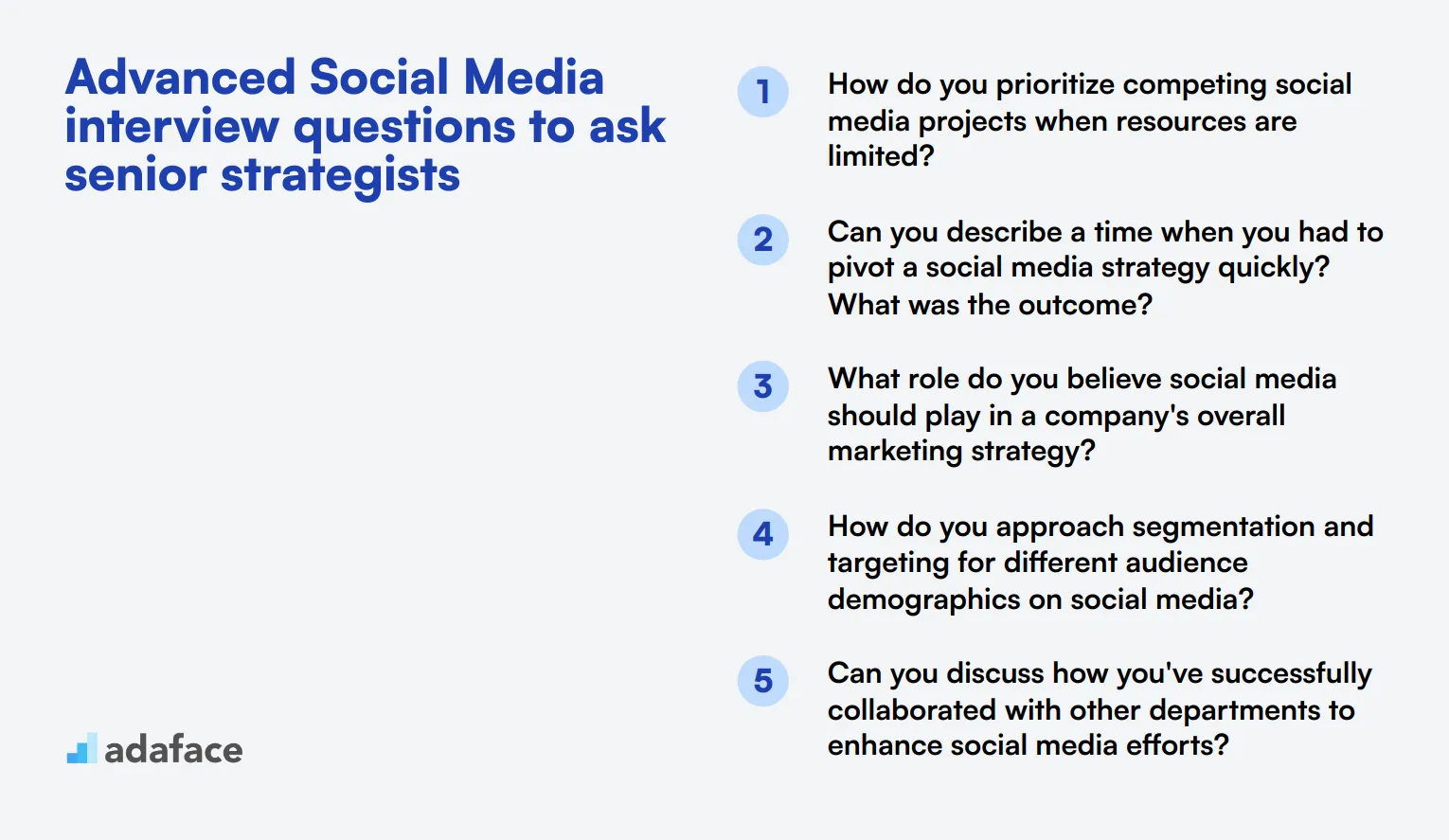
To ensure you find the right senior strategist for your social media team, consider using this list of advanced interview questions. These inquiries will help you gauge not only a candidate's experience but also their ability to think strategically and adapt to the ever-changing social media landscape. For a deeper understanding of what to look for in your candidates, check out our Social Media Coordinator Job Description.
- How do you prioritize competing social media projects when resources are limited?
- Can you describe a time when you had to pivot a social media strategy quickly? What was the outcome?
- What role do you believe social media should play in a company's overall marketing strategy?
- How do you approach segmentation and targeting for different audience demographics on social media?
- Can you discuss how you've successfully collaborated with other departments to enhance social media efforts?
- What methods do you use to analyze competitor social media strategies?
- How do you ensure that your team remains innovative when developing social media campaigns?
- Can you share an experience where data analysis led you to change your social media strategy?
- What are your thoughts on the future of social media marketing in the next five years?
- How do you build a brand voice that resonates well with various online communities?
- What steps do you take to maintain consistency across multiple social media platforms?
- Can you explain your approach to integrating user feedback into social media strategy?
- How have you leveraged emerging technologies (like AR or AI) in your social media strategies?
- What strategies do you implement to enhance social media accessibility for all users?
- How do you ensure compliance with legal regulations and ethical standards in social media marketing?
7 Social Media interview questions and answers related to content strategies
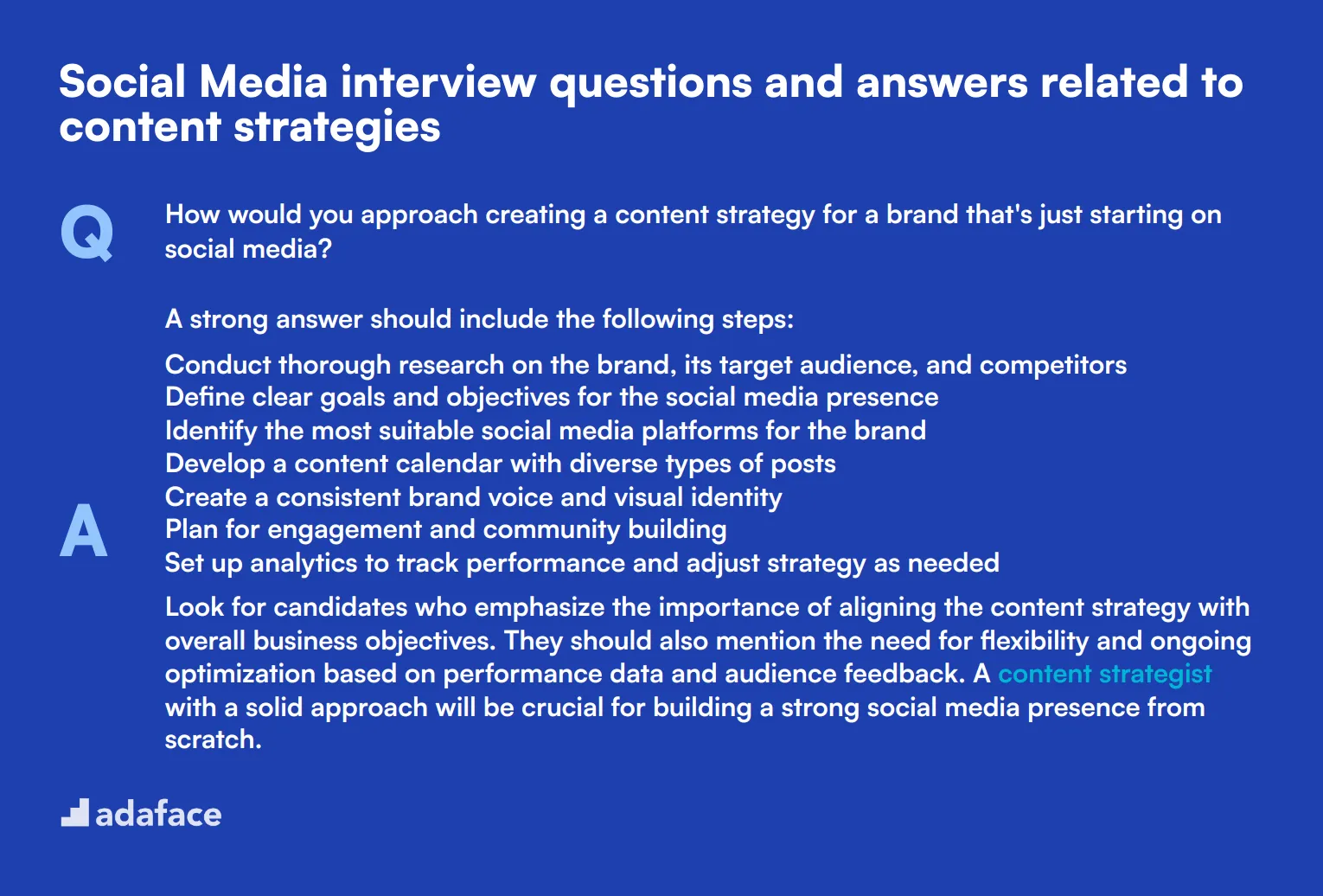
When interviewing for a social media role, it's crucial to assess a candidate's content strategy skills. These questions will help you gauge their ability to create, manage, and optimize content across various platforms. Use this list to evaluate how well potential hires can align content with business goals and engage your target audience effectively.
1. How would you approach creating a content strategy for a brand that's just starting on social media?
A strong answer should include the following steps:
- Conduct thorough research on the brand, its target audience, and competitors
- Define clear goals and objectives for the social media presence
- Identify the most suitable social media platforms for the brand
- Develop a content calendar with diverse types of posts
- Create a consistent brand voice and visual identity
- Plan for engagement and community building
- Set up analytics to track performance and adjust strategy as needed
Look for candidates who emphasize the importance of aligning the content strategy with overall business objectives. They should also mention the need for flexibility and ongoing optimization based on performance data and audience feedback. A content strategist with a solid approach will be crucial for building a strong social media presence from scratch.
2. Can you explain your process for identifying and leveraging trending topics in social media content?
A comprehensive answer should cover these key points:
- Regularly monitor social media platforms, trending hashtags, and industry news
- Use social listening tools to track conversations and emerging trends
- Analyze competitor content and industry influencers
- Evaluate trend relevance to the brand and target audience
- Quickly create and approve content to capitalize on trends
- Ensure brand voice consistency when participating in trends
- Measure engagement and results from trend-based content
Pay attention to candidates who emphasize the importance of speed and agility in responding to trends while maintaining brand integrity. They should also mention the need to balance trending content with evergreen posts to maintain a consistent content strategy. Look for examples of successful trend leveraging from their past experiences.
3. How do you ensure content consistency across different social media platforms while tailoring to each platform's unique features?
A strong response should include the following elements:
- Develop a comprehensive brand style guide for social media
- Create a content calendar that outlines themes and messages across platforms
- Adapt content format and tone to suit each platform's audience and features
- Use a centralized content management system for efficient cross-platform posting
- Maintain consistent visual branding elements (colors, fonts, imagery)
- Leverage platform-specific features (e.g., Instagram Stories, Twitter polls)
- Regularly audit content across platforms to ensure alignment
Look for candidates who demonstrate an understanding of each major social platform's unique characteristics and audience behaviors. They should emphasize the importance of maintaining a cohesive brand message while optimizing content for each platform's strengths. A skilled social media coordinator will be able to balance consistency with platform-specific customization effectively.
4. Describe your approach to creating and managing a user-generated content (UGC) campaign on social media.
A comprehensive answer should include these key steps:
- Define clear campaign objectives and guidelines
- Choose appropriate hashtags and create a compelling call-to-action
- Incentivize participation through contests or featured posts
- Engage with participants and share their content
- Obtain proper permissions for content usage
- Curate and showcase the best UGC across platforms
- Measure campaign success through engagement metrics and brand sentiment
- Integrate UGC into broader marketing efforts
Evaluate candidates based on their ability to balance encouraging participation with maintaining brand control. They should emphasize the importance of authenticity in UGC campaigns and discuss strategies for managing potential risks or negative content. Look for examples of successful UGC campaigns they've managed in the past and how they measured their impact.
5. How do you approach creating a content series or themed campaign for social media?
A strong answer should outline the following process:
- Identify campaign objectives and target audience
- Brainstorm themes that align with brand values and audience interests
- Develop a content calendar with diverse post types (e.g., videos, images, polls)
- Create a unique hashtag or visual identity for the series
- Plan for cross-platform promotion and potential influencer collaboration
- Prepare content in advance to ensure consistent posting
- Engage with audience responses and adjust content as needed
- Analyze performance and gather insights for future campaigns
Look for candidates who emphasize the importance of storytelling and maintaining audience interest throughout the series. They should discuss how they would tie individual posts to the broader campaign theme while keeping content fresh and engaging. Ask for specific examples of successful content series they've created and how they measured their effectiveness.
6. How would you use social media content to support a product launch?
An effective answer should include these strategies:
- Create a pre-launch teaser campaign to build anticipation
- Develop a unique hashtag for the product launch
- Prepare a mix of content types (e.g., product demos, behind-the-scenes footage)
- Leverage influencer partnerships for increased reach
- Host live Q&A sessions or product reveal events
- Encourage user-generated content with early adopters
- Implement a countdown strategy leading up to the launch
- Provide exclusive content or offers to social media followers
- Monitor and engage with audience reactions in real-time
Evaluate candidates based on their ability to create an integrated content strategy that builds excitement and drives conversions. They should discuss how they would tailor content for different stages of the launch (pre-launch, launch day, post-launch) and across various platforms. Look for examples of successful product launches they've supported through social media content.
7. How do you measure the effectiveness of your social media content strategy?
A comprehensive answer should cover these key points:
- Set clear, measurable objectives aligned with business goals
- Track platform-specific metrics (e.g., engagement rate, reach, impressions)
- Monitor audience growth and demographics
- Analyze content performance by type, time of posting, and theme
- Use UTM parameters to track website traffic and conversions
- Measure share of voice and brand sentiment
- Conduct regular content audits to identify top-performing posts
- Use A/B testing to optimize content strategy
- Create custom reports to communicate results to stakeholders
Look for candidates who emphasize the importance of both quantitative and qualitative metrics. They should demonstrate knowledge of various analytics tools and the ability to derive actionable insights from data. A skilled digital marketer will be able to explain how they use these metrics to continuously refine and improve the content strategy.
9 Social Media interview questions and answers related to performance metrics
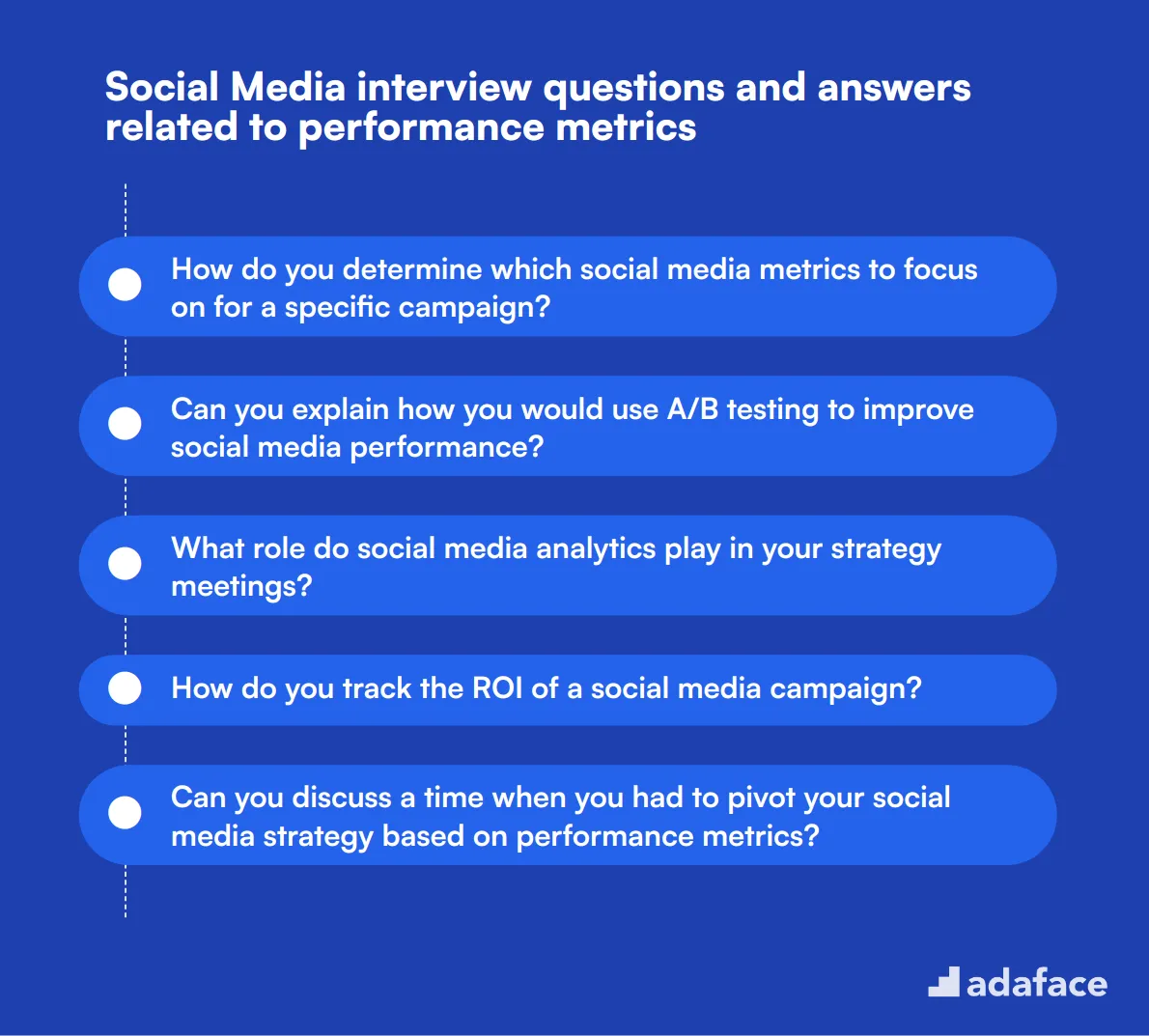
Want to know if your candidates truly understand the ins and outs of social media performance metrics? This list of nine essential questions will help you gauge their knowledge and ensure they can track, analyze, and optimize your social media efforts effectively.
1. How do you determine which social media metrics to focus on for a specific campaign?
An ideal candidate would begin by stating that the choice of metrics depends on the goals of the campaign. For instance, if the aim is to increase brand awareness, they might focus on metrics like reach and impressions. If the goal is to drive engagement, they would look at likes, comments, shares, and click-through rates.
Next, they may explain that it's crucial to align these metrics with overall business objectives. For example, if the campaign seeks to boost sales, measuring conversion rates, and ROI would be essential. They should also mention the importance of using tools like Google Analytics or platform-specific insights to gather and interpret these data points.
Look for candidates who can clearly connect specific metrics to business goals and who demonstrate an understanding of different analytic tools. Follow up by asking how they adjust their focus if initial metrics aren't meeting expectations.
2. Can you explain how you would use A/B testing to improve social media performance?
A/B testing, or split testing, involves creating two different versions of a social media post or ad to see which performs better. The candidate should explain that they would change one variable at a time, such as the headline, image, or call-to-action, to isolate the impact of each element.
They may mention that they would run these tests simultaneously to a similar audience to ensure accurate results. After gathering sufficient data, they would analyze which version had better engagement, conversions, or other key metrics, and then apply these insights to future content.
An ideal candidate should stress the importance of continuous testing and optimization, showing a commitment to improving performance over time. Follow up by asking for examples of successful A/B tests they've conducted.
3. What role do social media analytics play in your strategy meetings?
Social media analytics provide valuable insights that drive strategy decisions. The candidate should mention that they regularly review performance data to identify trends, track progress toward goals, and pinpoint areas for improvement.
They might use examples such as adjusting content types, posting times, or platform focus based on what the data reveals. They should also emphasize the importance of sharing these insights with their team to ensure everyone is aligned and informed.
Look for candidates who demonstrate a systematic approach to using analytics in their strategy. Follow up by asking how they communicate these insights to stakeholders or team members.
4. How do you track the ROI of a social media campaign?
Tracking ROI involves comparing the cost of the campaign to the revenue generated or value created. The candidate should explain that they use specific metrics like conversion rates, cost per click (CPC), and overall sales to measure ROI.
They might also mention using tools like Google Analytics, Facebook Insights, or other tracking software to gather data. They should be able to discuss how they attribute sales or conversions to specific social media efforts, often using UTM parameters or custom tracking links.
An ideal candidate should show a clear understanding of how to connect social media efforts to tangible business outcomes. Follow up by asking for an example of a campaign where they successfully tracked and reported ROI.
5. Can you discuss a time when you had to pivot your social media strategy based on performance metrics?
A good candidate should share a specific example where initial metrics indicated that a campaign was underperforming. They should explain how they analyzed the data and identified key issues, such as low engagement or high bounce rates.
They might discuss the steps they took to pivot the strategy, such as changing the content format, adjusting the targeting parameters, or experimenting with different posting times. They should also mention the eventual outcomes and any lessons learned.
Look for candidates who demonstrate flexibility and a data-driven approach to strategy adjustments. Follow up by asking how they measure the success of the new strategy after implementing changes.
6. How do you use engagement metrics to refine your content strategy?
The candidate should explain that they regularly review engagement metrics like likes, comments, shares, and click-through rates to gauge how well their content resonates with the audience. They would use these insights to identify which types of posts perform best and which topics generate the most interest.
They might mention that they adjust their content strategy by increasing the frequency of high-performing posts, experimenting with new formats, or focusing more on popular topics. They should also discuss the importance of A/B testing and iterative improvements.
An ideal candidate should demonstrate an ability to derive actionable insights from engagement metrics and a commitment to continuous improvement. Follow up by asking for an example of how they used engagement data to refine their strategy.
7. What methods do you use to analyze and report on social media performance to stakeholders?
Candidates should mention that they use a combination of tools like Google Analytics, social media platform insights, and third-party analytics tools to gather data. They would then create comprehensive reports that highlight key metrics, trends, and insights.
They might discuss the importance of tailoring reports to the audience, providing high-level summaries for executives and more detailed analysis for the marketing team. They should also mention the use of visual aids like charts and graphs to make the data more accessible.
Look for candidates who can articulate complex data in a way that is understandable and actionable for different stakeholders. Follow up by asking for an example of a report they've created and how it was received by the audience.
8. How do you use competitor analysis to inform your social media strategy?
Competitor analysis involves monitoring and evaluating the social media activities of key competitors. The candidate should explain that they track competitors' content types, posting frequencies, engagement rates, and audience growth to identify best practices and opportunities.
They might mention tools like Social Blade or Sprout Social to gather data and how they use these insights to benchmark their performance and identify gaps in their strategy. They should also discuss the importance of staying agile and responsive to changes in the competitive landscape.
An ideal candidate should demonstrate a strategic approach to competitor analysis and an ability to apply these insights to improve their own social media efforts. Follow up by asking for a specific example of how competitor analysis influenced a campaign.
9. How do you approach measuring the success of user-generated content (UGC) campaigns?
The candidate should explain that they measure the success of UGC campaigns through metrics like engagement rates, reach, and the volume of content generated. They might also mention tracking sentiment analysis to gauge how the audience perceives the UGC.
They should discuss the importance of setting clear objectives for the campaign, such as increasing brand awareness or fostering community engagement, and aligning these objectives with the metrics they track. Additionally, they might use tools like social listening platforms to monitor UGC performance.
Look for candidates who demonstrate a clear understanding of the unique challenges and benefits of UGC campaigns. Follow up by asking for an example of a successful UGC campaign they managed and how they measured its success.
9 situational Social Media interview questions with answers for hiring top specialists
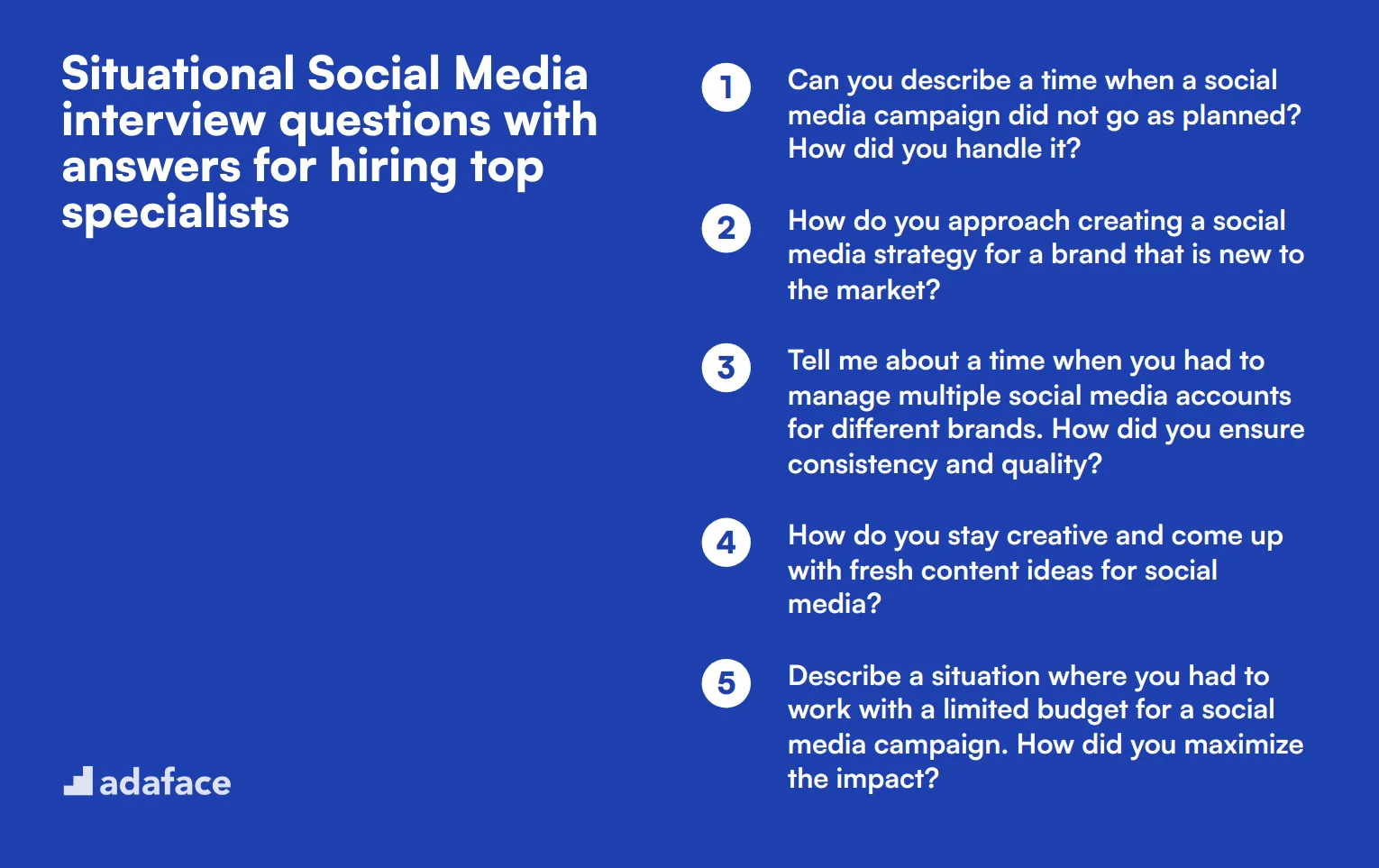
When it comes to hiring top social media specialists, situational questions can be a game-changer. These questions help you gauge how candidates think on their feet and handle real-world scenarios, ensuring they have the practical skills to back up their resumes. Use this list of questions to delve deeper into their problem-solving abilities and creativity.
1. Can you describe a time when a social media campaign did not go as planned? How did you handle it?
In the fast-paced world of social media, not every campaign will hit the mark. Candidates should discuss a specific instance where a campaign did not meet expectations and the steps they took to address the issue.
Look for responses that include analyzing what went wrong, adjusting strategies in real-time, and communicating transparently with stakeholders. This will show their ability to adapt and learn from setbacks.
2. How do you approach creating a social media strategy for a brand that is new to the market?
Creating a social media strategy for a new brand involves several key steps. Candidates should mention researching the target audience, analyzing competitors, and defining clear goals for the brand's social media presence.
You should hear them talk about building a content calendar, engaging with followers, and using analytics to track progress. An ideal answer will demonstrate their ability to balance creativity with strategic planning.
3. Tell me about a time when you had to manage multiple social media accounts for different brands. How did you ensure consistency and quality?
Managing multiple social media accounts requires strong organizational skills and attention to detail. Candidates should describe their process for setting up a content calendar, using scheduling tools, and maintaining brand guidelines across platforms.
It's important to look for examples of cross-functional collaboration and effective time management. The best answers will highlight their ability to juggle various responsibilities without compromising on quality.
4. How do you stay creative and come up with fresh content ideas for social media?
Creativity is essential for keeping social media content engaging. Candidates might mention browsing industry blogs, attending webinars, or collaborating with team members to brainstorm new ideas.
Expect them to discuss how they keep track of emerging trends and audience interests. Look for an answer that shows a mix of proactive research and ongoing inspiration.
5. Describe a situation where you had to work with a limited budget for a social media campaign. How did you maximize the impact?
Working with a limited budget often requires creativity and strategic thinking. Candidates should provide examples of prioritizing high-impact activities, leveraging organic reach, and utilizing cost-effective tools.
Look for details on how they measured the campaign's success and optimized resources. The best responses will show their ability to achieve results even with financial constraints.
6. How do you handle negative comments or feedback on social media?
Negative comments are inevitable, but how they're handled makes all the difference. Candidates should discuss strategies for responding promptly, remaining professional, and addressing the issue constructively.
You should look for mentions of turning negative feedback into a positive experience and using it to improve the brand's offerings. Strong answers will highlight their conflict resolution skills and empathy.
7. How would you approach running a social media contest or giveaway?
Running a successful social media contest involves several key steps. Candidates should talk about setting clear rules, promoting the contest across multiple channels, and engaging with participants.
Expect them to mention monitoring entries, announcing winners transparently, and analyzing the contest's impact. An ideal response will show their ability to boost engagement and grow the brand's following.
8. Can you give an example of a time when you used data to improve your social media strategy?
Data-driven decision-making is crucial for refining social media strategies. Candidates should provide a specific instance where they analyzed metrics and identified areas for improvement.
Look for mentions of adjusting content types, posting schedules, or targeting methods based on data insights. Strong answers will show their ability to translate data into actionable strategies.
9. How do you ensure that your social media content is accessible to all users?
Accessibility is an important aspect of social media management. Candidates should discuss strategies for using alt text for images, providing captions for videos, and writing clear, concise copy.
Look for mentions of testing content for accessibility and staying updated on best practices. An ideal answer will demonstrate their commitment to inclusivity and user experience.
Which Social Media skills should you evaluate during the interview phase?
While it's impossible to evaluate every aspect of a candidate's Social Media expertise in a single interview, focusing on core skills is crucial. The following key areas provide a comprehensive view of a candidate's Social Media proficiency.
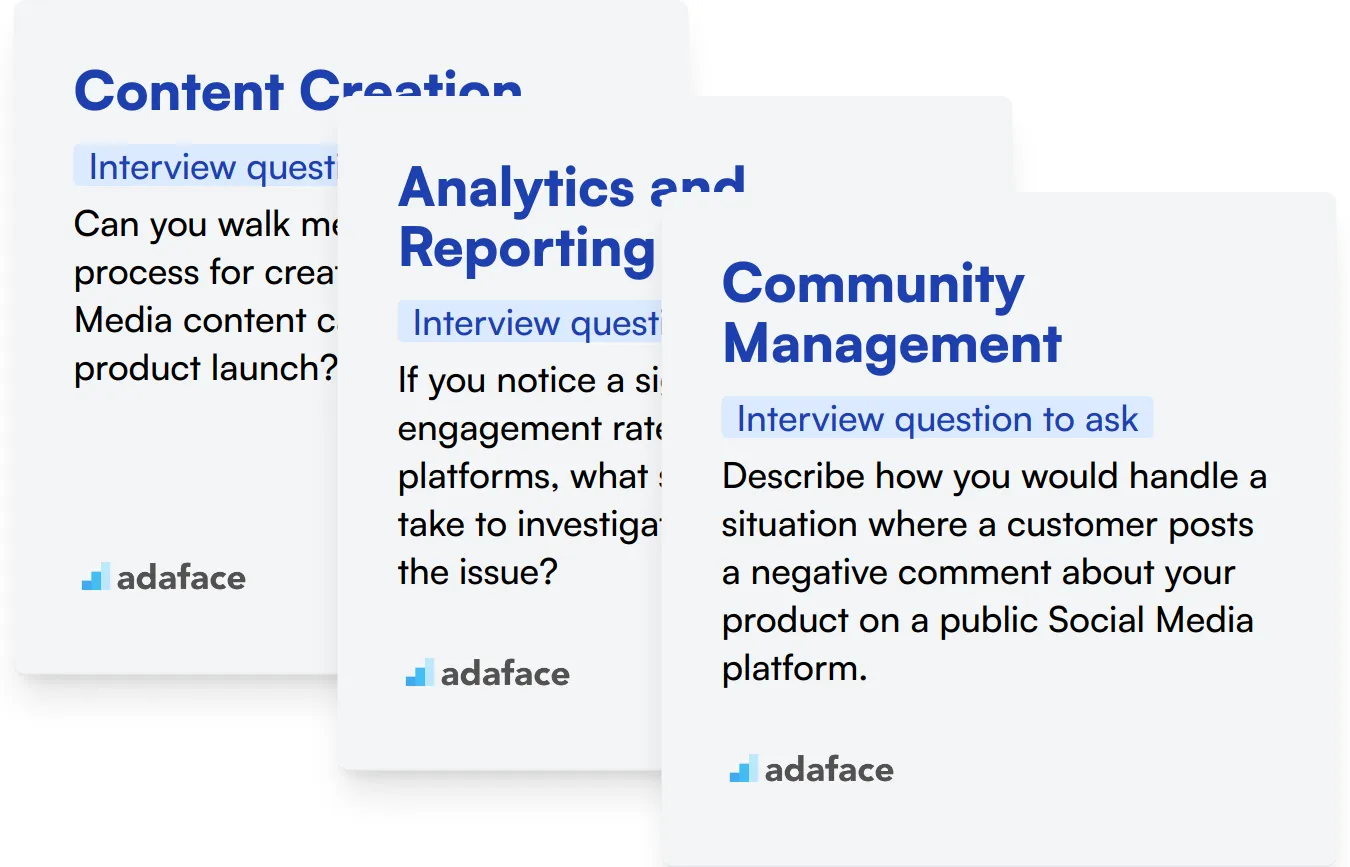
Content Creation
Content creation is at the heart of Social Media marketing. It involves crafting engaging posts, images, and videos that resonate with the target audience and align with brand voice.
To assess this skill, consider using an assessment test with relevant MCQs. This can help filter candidates based on their content creation knowledge.
During the interview, ask targeted questions to gauge the candidate's content creation abilities. Here's an example:
Can you walk me through your process for creating a Social Media content calendar for a new product launch?
Look for answers that demonstrate strategic thinking, audience understanding, and platform-specific knowledge. Strong candidates will mention research, goal-setting, and content variety.
Analytics and Reporting
Understanding Social Media metrics and deriving actionable insights is crucial. This skill enables data-driven decision-making and campaign optimization.
To evaluate this skill, you might use an assessment test with questions on key performance indicators and analytics tools.
During the interview, ask a question that tests the candidate's ability to interpret Social Media data:
If you notice a significant drop in engagement rates across all platforms, what steps would you take to investigate and address the issue?
Look for responses that include analyzing multiple data points, considering external factors, and proposing strategic adjustments. Strong candidates will demonstrate a methodical approach to problem-solving.
Community Management
Effective community management involves engaging with followers, handling customer inquiries, and fostering a positive brand image. It's a key component of building brand loyalty on Social Media platforms.
Consider using a customer service test to assess candidates' ability to handle various Social Media interactions.
To evaluate this skill during the interview, you might ask:
Describe how you would handle a situation where a customer posts a negative comment about your product on a public Social Media platform.
Look for answers that demonstrate empathy, problem-solving skills, and brand awareness. Strong candidates will emphasize quick response times, moving the conversation to private channels when appropriate, and finding a resolution that satisfies the customer while protecting the brand's reputation.
Enhance Your Hiring Strategy with Social Media Skills Tests and Targeted Interview Questions
When hiring for social media roles, verifying the candidate's skills accurately is key to ensuring they can meet your business needs.
The best way to assess these skills is through targeted skills tests. Consider utilizing tests like the Digital Marketing Test or the Content Strategy Test from Adaface to accurately gauge candidate qualifications.
After candidates have completed the tests, you can efficiently shortlist the top performers. These selected candidates can then be invited for in-depth interviews to further assess their fit for your social media roles.
To get started, create an account on Adaface to access our comprehensive test library and start hiring the best talent. Visit our signup page to begin the process.
Digital Marketing Test
Download Social Media interview questions template in multiple formats
Social Media Interview Questions FAQs
Asking specific questions helps evaluate the candidate's practical knowledge and experience in managing social media strategies and tools.
Look for answers that mention key performance indicators (KPIs), analytics tools, and examples of data-driven decision-making.
A good social media manager should be creative, analytical, adaptable, and knowledgeable about current social media trends and tools.
Situational questions help gauge a candidate's problem-solving abilities, critical thinking, and how they handle real-world social media challenges.
Tailor the questions based on the role's complexity: general questions for junior roles, intermediate for mid-tier, and advanced for senior strategists.
Yes, skills tests can complement interview questions by providing practical evidence of the candidate's abilities.

40 min skill tests.
No trick questions.
Accurate shortlisting.
We make it easy for you to find the best candidates in your pipeline with a 40 min skills test.
Try for freeRelated posts
Free resources




